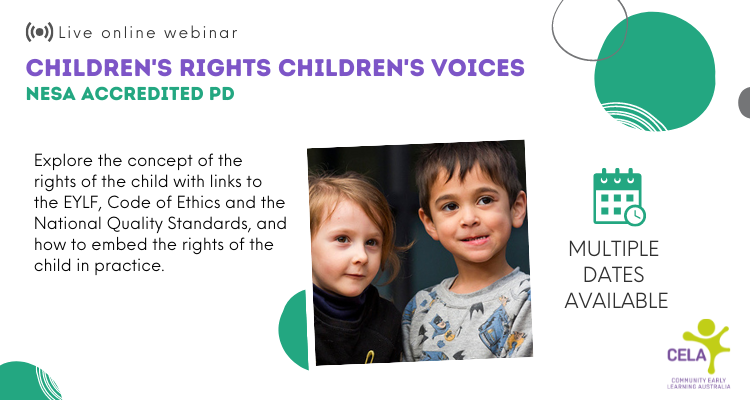The question of whether to include nappy change facilities in a service is something that comes up frequently for early learning interior architecture designer Tracey Sharp.
“What’s happening at the moment is there’s a conflict,” says Tracey, who spent over 20 years working in the ECEC sector before making a career shift into interior achitectural design. “The National Construction Code says that nappy change facilities aren’t required for services that don’t provide care for children under the age of three.
“Obviously, this isn’t an issue for most long daycare centres. However, it becomes an issue in preschools that are brand new or redeveloping. In the case of a redevelopment, they don’t already have those facilities, so they may choose not to include them in the new design.”
Are we holding children to impossible standards?
The law is one thing but does the law align with what we know about child development? Are we creating environments that are inclusive of children's individual stages of development?
Developmental Milestones and the Early Years Learning Framework and the National Quality Standards resource notes that between the ages of 3-5, we may observe that children can go to the toilet by themselves.1 Research suggests that only 40-60% of children are daytime toilet trained before they reach the age of three.2 That means that possibly only half of children are toilet trained by the time they reach the magic milestone of three.
Tracey says this conflict between reality and the National Building Code is problematic.
“There are some children that just aren’t ready to toilet train before the age of three,” she explains. “Potentially, they’ve had a traumatic experience with toileting and feel ashamed or embarrassed. But nappy change facilities and toilets are actually learning spaces for children. So we need to treat them as such.”
The bottom line on toilet training
The Victorian Government Better Health website recommends keeping children in nappies until they show signs that they are ready to start toilet training. These signs include interest in using the toilet, maturity to recognise the urge to use the toilet and a dislike of wearing nappies.3 Parenting expert Janet Lansbury advocates for a child-led approach as the key to successful toilet training.4
There are many reasons why a child may not be toilet trained by the age of three, some of which are quite serious. Children may have an underactive or overactive bladder5, or they may be going through an emotional life change, such as welcoming a new sibling.6 Children with additional needs can also take longer to master toileting.7
What are the ethical considerations?
Jennifer Moglia, Executive Officer Professional Learning at CELA, suggests that even though this may not be a legal issue, it does have ethical implications.
“How is a child allowed to 'be' if they’re not ready to toilet train?” she asks. “How are we guided by the framework of being, belonging and becoming if we’re not supporting children to be who they are at the stage they’re at?”
The issue of dignity and supporting children is one thing, but Jennifer also says that inclusion is a concern.
“What are we saying to our community if children that aren’t toilet trained are excluded from our service? What does it say about the philosophy of the service and its practices? It’s important to include all children, regardless of whether or not they’re able to independently use the toilet.”
Tracey echoes Jennifer’s sentiments and believes that not including nappy-changing facilities impacts on the rights and dignity of the child.
“There are some children that are just not ready to toilet train before the age of three,” she says. “If they can’t attend preschool or move to the next room at their long daycare centre, what does that say to them?”
What does this mean for the future?
Jennifer suggests considering policies and procedures and priority of access guidelines in making the decision about nappy-changing facilities. However, there is also an important human element that can be a critical difference in the success of a new way of doing things.
“This requires critical reflection and discussion,” she explains. “There may be some procedural training required, but what’s most important is that educators are supported to understand the ‘why’ behind the decision to embrace the potential for greater inclusion of all children.”
References:
1. Australian Government Department of Education, Employment and Workplace Relations. Early Years Learning Framework Practice-Based Resources - Developmental Milestones.
2. Anna Christie. Toilet Training Infants and Children in Australia: 2010. Restraint Project UNSW.
3. Victorian Government. Toilet Training. Better Health.
4. Janet Lansbury. 3 Reasons Kids Don’t Need Toilet Training (And What To Do Instead). August, 2014.
5. Continence Foundation of Australia. Daytime Wetting. November, 2020.
6. Continence Foundation of Australia. Toilet Training. August, 2022.
7. Continence Foundation of Australia. Toilet Training Children with Special Needs. May, 2019.
Resources:
Toileting and Nappy Changing Principles and Practices
Child Care Planning Guideline
Child Care Centre Building Code, Regulations & Requirements
CELA professional development relating to this topic

Find out more
About CELA
Community Early Learning Australia is a not for profit organisation with a focus on amplifying the value of early learning for every child across Australia - representing our members and uniting our sector as a force for quality education and care.